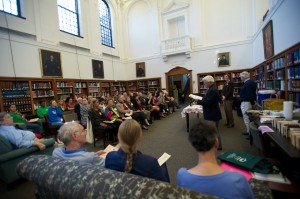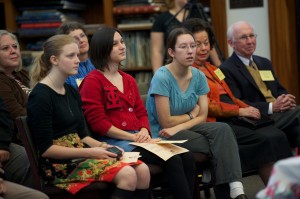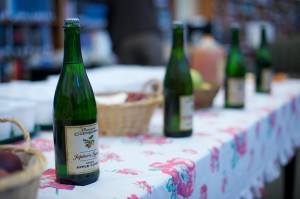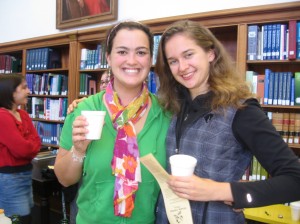 Friends of Library – Apple Cider Program
Friends of Library – Apple Cider Program
On a bright beautiful October day, the Friends of Library hosted Tom Burford and Charlotte Shelton at the annual fall meeting. Members of Friends of Library, students, faculty and folks from the community gathered in the east end of the Kitty Corbett Powell ’38 Reading Room for the program. A fine table of apples and ciders were arranged for everyone to see.
Tom Burford, an Amherst County native, is an orchard and nursery consultant, specializing in the restoration, re-creation, and design of historic sites and private estates, as well as commercial and backyard orchards. He lectures and conducts seminars and workshops nationwide. He consults in Virginia with historic properties including Monticello, Mount Vernon and Colonial Williamsburg; he has designed orchards locally in Lynchburg at the City Cemetery and Point of Honor. One work in progress is an orchard for the White House as part of the Obamas’ victory garden. He is the author of Apples: A Catalog of International Varieties, co-author of Fruit Grafters Handbook with Ed Fackler, and contributor of fruits content to The Northeastern Garden Book, published by Sunset Books. In 1997, he discontinued the nursery operation of his company, Burford Brothers in Monroe, Virginia, to devote full time to consulting. Tom Burford was also at one time a furniture maker and many pieces in the Florence Elston Inn at Sweet Briar College are his creations.
Charlotte Shelton founded Vintage Virginia Apples, LLC, in North Garden, Virginia, with her family in 2000. In her “spare time,” she is an investment professional with a national brokerage firm. Tom Burford was a consultant to their enterprise. She said the company is hoping to tap into Central Virginia’s growing agri-tourism market and with dozens of wineries in the region, it seems only natural that thirsty tourists and Charlottesville food lovers would want to check out the complex flavors of high-end cider. “The average wine drinker will find our cider appealing and interesting,” she told the Friends.
“We have about 250 varieties of apples, and that’s not a very sensible way to grow an orchard,” Shelton said. But there is one thing that a huge variety of apples are good for: a nice cider, she said. Her orchard markets the cider through Albemarle CiderWorks, which sells hard cider, and sweet cider in season. The Shelton family also runs a nursery, selling the hard-to-find apple trees.
The friends were treated to four ciders from CiderWorks and a variety of apples were tasted. The ciders were: Jupiter’s Legacy named after a slave and Thomas Jefferson’s most trusted servant for years. It is a fruity blend of classic American cider apples — Harrison, Yates, Hyslop and Virginia Crab. The second, Old Virginia Winesap, is spicy, floral, and fruity, slightly tart with a lingering finish. The third, Royal Pippin is a fruity cider crafted entirely from Albemarle Pippins. It is a dry cider that has a champagne-like quality. And the last, Ragged Mountain, is a cider blend of classic apple varieties — Albemarle Pippin, Winesap, Black Twig, Grimes Golden and Stayman — historically grown on and around the Ragged Mountains where Shelton’s orchard is located. This is a semi-dry cider crafted to please a wide range of palates. The apples tasted by the Friends were Arkansas Black, Russet, Winesap and Albemarle Pippin.
Tom and Charlotte talked at length about the reduction in the number of apples available to consumers today. Although Central Virginia has a rich history as an apple-growing area, it’s sometimes hard to find apples in more than a handful of varieties, even at the farmers’ market. At one time, there were more than 14,000 varieties of apples growing in the United States, and hundreds of varieties growing in orchards in this area. Tom Burford remembers 31 orchards of varying size in the Elon and Amherst areas close the Sweet Briar. Now there are less than five. But this is changing with the local foods movement. “I never thought, 10 years ago, that we would have come this far,” says Tom enthusiastically. “It’s an exciting time for me.”
One of Burford’s favorite apples for the first fresh pie of the year is the Carolina Red June, which ripens in late June in central Virginia. Although Burford declares he loves all apples, perhaps his all-time pick is the russeted Ashmead’s Kernel, which originated in England around 1700. “It has a lot of sugar and a lot of acid,” he says, “and when picked and allowed to mellow, its taste will knock your socks off. I really recommend that sissies don’t eat it.”
Fortunately, Burford is not alone in his quest to preserve the apple’s dignity, for this is a fruit with an ancient pedigree, having come to symbolize almost everything in life from stolen pleasures to homey comforts–and plenty in between. It’s possible that apples were the very first beloved fruit. But the first of the sweet apples resembling today’s picks appeared several thousand years ago in Kazakhstan. The ancient Greeks domesticated at least a dozen different kinds of apples. Among these, the tiny Lady apples are still grown and enjoyed today for their delicate sweetness and as decorations in holiday boxwood wreaths.
From Europe, apples made their way to the New World with early settlers–not to be grown for their good eating qualities, but to be grown from seeds for their juice, which farmers used to make into hard cider each fall. But early Americans soon learned that apples made good eating, not only raw out of hand but turned into pies, puddings, sauces, dumplings and cakes. In colonial America, apples were also dried for later use.
Asked what his favorite apple was, Burford said my favorite apple is the last apple I ate.” He also talked about the Rawls apple grown by an Amherst County family that became the apple that was crossed with the red delicious to become the Fuji.
Jennifer Will ’13 one of the many students at the event said she thought that Tom Burford, the resident apple expert, and Charlotte Shelton, the businesswoman, made a great team. Both of them were knowledgeable in their fields (Tom talked extensively about the apples themselves and apple production, while Charlotte focused on the history of cider and her company) and had a mutual respect for each other.
“It was great to see a family-owned company whose success was based on the quality of the product alone. Tom has a passion for growing quality apples, while Charlotte has a passion for making great cider” said Ms. Will.
She added, “The talk itself was informative, and I learned a lot about the process of making cider as well as the history of cider in the United States. Charlotte and Tom were knowledgeable without being condescending, which I appreciated. And of course, the apples and cider that we tasted were excellent!”


